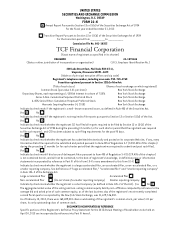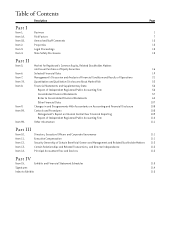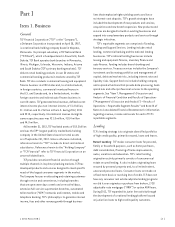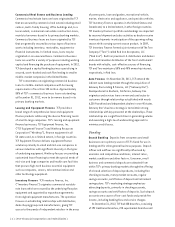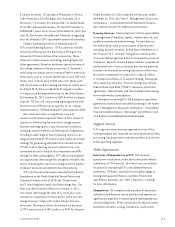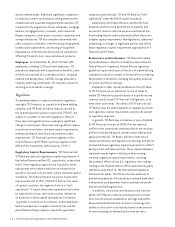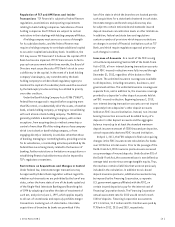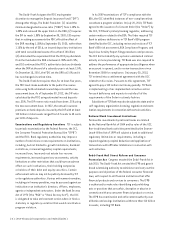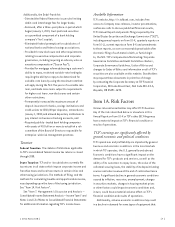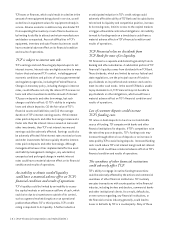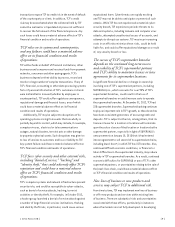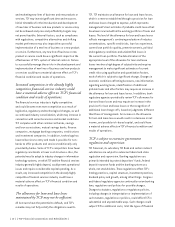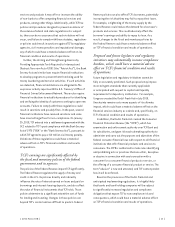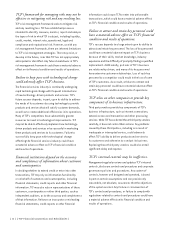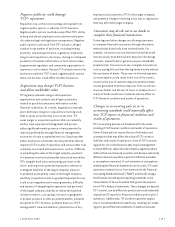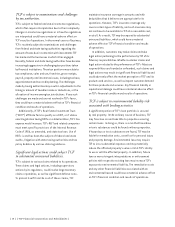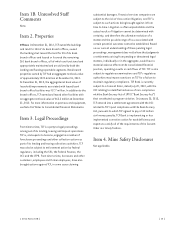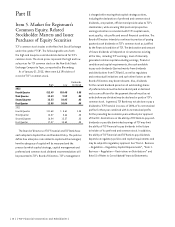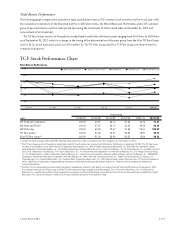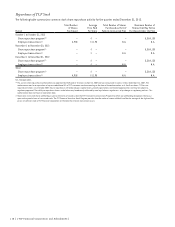TCF Bank 2012 Annual Report Download - page 24
Download and view the complete annual report
Please find page 24 of the 2012 TCF Bank annual report below. You can navigate through the pages in the report by either clicking on the pages listed below, or by using the keyword search tool below to find specific information within the annual report.TCF leases or finances, which could result in a decline in the
amount of new equipment being placed in service, as well
as declines in equipment values for equipment already in
service. Adverse economic conditions may also hinder TCF
from expanding the inventory or auto finance businesses
by limiting its ability to attract and retain manufacturers
and dealers as expected. Any such difficulties in TCF’s
equipment, inventory and auto finance businesses could
have a material adverse effect on its financial condition
and results of operations.
TCF is subject to interest rate risk.
TCF’s earnings and cash flows largely depend upon its net
interest income. Interest rates are highly sensitive to many
factors that are beyond TCF’s control, including general
economic conditions and policies of various governmental
and regulatory agencies, including the Federal Reserve.
Changes in monetary policy, including changes in interest
rates, could influence not only the interest TCF receives on
loans and other investments and the amount of interest
TCF pays on deposits and other borrowings, but such
changes could also affect: (i) TCF’s ability to originate
loans and obtain deposits; (ii) the fair value of TCF’s
financial assets and liabilities; and (iii) the average
duration of TCF’s interest-earning assets. If the interest
rates paid on deposits and other borrowings increase at a
faster rate than the interest rates received on loans and
other investments, then TCF’s net interest income and
earnings could be adversely affected. Earnings could also
be adversely affected if the interest rates received on loans
and other investments fall more quickly than the interest
rates paid on deposits and other borrowings. Although
management believes it has implemented effective asset
and liability management strategies, any substantial,
unexpected and prolonged change in market interest
rates could have a material adverse effect on its financial
condition and results of operations.
An inability to obtain needed liquidity
could have a material adverse effect on TCF’s
financial condition and results of operations.
TCF’s liquidity could be limited by an inability to access
the capital markets or unforeseen outflows of cash, which
could arise due to circumstances outside of its control,
such as a general market disruption or an operational
problem that affects TCF or third parties. TCF’s credit
rating is important to its liquidity. A further reduction
or anticipated reduction in TCF’s credit ratings could
adversely affect the ability of TCF Bank and its subsidiaries
to lend and its liquidity and competitive position, increase
its borrowing costs, limit its access to the capital markets
or trigger unfavorable contractual obligations. An inability
to meet its funding needs on a timely basis could have a
material adverse effect on TCF’s financial condition and
results of operations.
TCF Financial relies on dividends from
TCF Bank for most of its liquidity.
TCF Financial is a separate and distinct legal entity from its
banking and other subsidiaries. A substantial portion of TCF
Financial’s liquidity comes from dividends from TCF Bank.
These dividends, which are limited by various federal and
state regulations, are the principal source of funds to
pay dividends on its preferred and common stock and to
meet its other cash needs. In the event TCF Bank is unable
to pay dividends to it, TCF Financial may not be able to
pay dividends or other obligations, which would have a
material adverse effect on TCF’s financial condition and
results of operations.
Loss of customer deposits could increase
TCF’s funding costs.
TCF relies on bank deposits to be a low cost and stable
source of funding. TCF competes with banks and other
financial institutions for deposits. If TCF’s competitors raise
the rates they pay on deposits, TCF’s funding costs may
increase through either a loss of deposits or an increase in
rates paid by TCF to avoid losing deposits. Increased funding
costs could reduce TCF’s net interest margin and net interest
income, which could have a material adverse effect on TCF’s
financial condition and results of operations.
The soundness of other financial institutions
could adversely affect TCF.
TCF’s ability to engage in routine funding transactions
could be adversely affected by the actions and commercial
soundness of other financial institutions. TCF routinely
executes transactions with counterparties in the financial
industry, including brokers and dealers, commercial banks
and other institutional clients. As a result, defaults by,
or even rumors regarding, any financial institutions, or
the financial services industry generally, could lead to
losses or defaults by TCF or a counterparty. Many of these
{ 8 } { TCF Financial Corporation and Subsidiaries }



